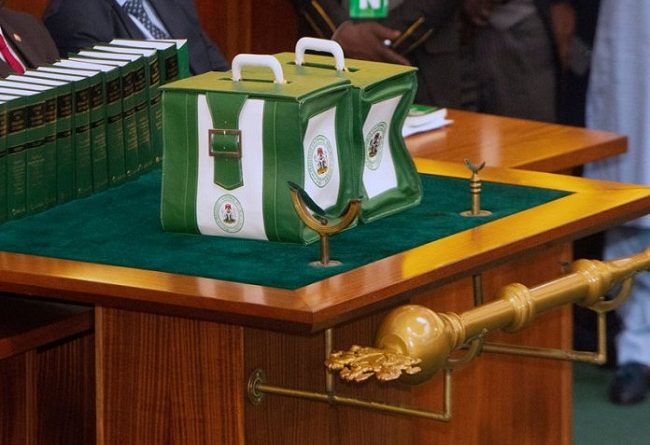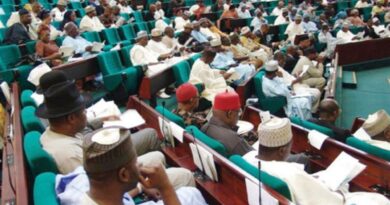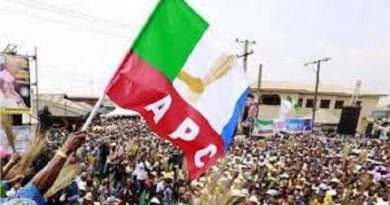FG Set To Review 2020 Budget Oil Price Benchmark To $20, Says Ahmed
Following persistent volatility in the oil market, the federal government is considering lowering the oil price benchmark in the 2020 Budget from $57 to $20, the Minister of Finance, Budget and National Planning, Mrs. Zainab Ahmed, said yesterday.
She spoke at a web conference on Citizens’ Dialogue Session on Government Fiscal Policy Decisions on the fall in Oil Prices and the COVID-19 pandemic.
She added that the federal government would slash the benchmark to $20 per barrel to reflect the new price level.
The minister spoke just as news came that the International Monetary Fund (IMF) had disbursed the $3.4 billion emergency assistance fund it had approved for Nigeria to the Central Bank of Nigeria (CBN).
The web conference was organised by the Ministry of Finance, Budget and National Development in collaboration with Partnership to Engage, Reform and Learn (PERL) and the UK Department for International Development (DFID).
Following the grave impact of COVID-19 and a spat between Russia and Saudi Arabia, oil price had plummeted, forcing the federal government to propose a downward review of its $57 oil price benchmark to $30 in an amendment discussed with the National Assembly leadership a month ago.
It also reviewed its proposed production volumes from 2.18 million barrels per day to 1.70 million barrels.
This effectively necessitated the shaving off of the total sum of N312.820 billion, representing 15 per cent of its N10.59 trillion budget passed in December last year.
The federal government has also decided not to hold bidding rounds for major oilfields until crude prices recover while some upstream projects will be completed much later than originally planned as a result of the crash in the price of crude oil.
Nigeria is grappling with a significant drop in oil prices and a collapse in global fuel demand caused by lockdown measures aimed at containing COVID-19.
Therefore, it has projected the country’s economy to contract by 3.4 per cent, as dwindling oil revenues and the pandemic forced the country to cut the budget plans for a second time to assume a lower petroleum price of $20 per barrel.
However, as Italy, Spain, Nigeria, and India, together with Ohio and other states in the United States began allowing some people to go back to work and also opened up construction sites, parks, and libraries, oil price jumped again yesterday on hopes of a recovery in fuel demand.
“We are in the process of an amendment that is bringing down the revenue indicator to $20 per barrel,” Ahmed said at the web conference.
She added that Nigeria was having trouble selling some of its oil cargoes and would have to cut production to below what it originally expected in the budget. The country, as part of an agreement with OPEC and other producing nations, agreed to trim output to help balance the global market.
As a result of the cuts and lower prices, the budget office director said projected oil and gas revenues would drop by over 80 per cent this year.
Ahmed and the Group Managing Director of the Nigerian National Petroleum Corporation (NNPC), Malam Mele Kyari, said at the conference that the delay in some licensing rounds cut the country’s projected revenue from signature bonuses to N350 billion ($972.22 million) this year from N939 billion originally expected.
They said most of the anticipated revenue would come from licence renewals.
The minister said some upstream oil and gas projects would be delivered “much later than originally planned” due to scaled back government investments.
“Where you require foreign investment…this is not a good time,” Kyari said of the licensing rounds, adding that “the appetite would be very low.”
The federal government is, however, accelerating bidding rounds for so-called “marginal” fields, which Kyari said were less impacted by low oil prices because they would likely be taken up by local producers and would require less capital to develop.
Budget Office Director-General, Mr. Ben Akabueze, according to Reuters, emphasised that oil revenues were expected to fall by more than 80 per cent.
He said the government had revised its projections and expected the economy to contract by 3.4 per cent this year compared with its previous expectation that it would grow by 2.9 per cent.
Nigeria would speed up marginal field licensing and oil mining licence renewals to try to raise revenues, Akabueze said.
The government officials also discussed the issue of Nigeria’s debt servicing costs.
The finance minister said Nigeria was in talks to defer debt service obligations to “2021 and beyond.”
“It’s not debt forgiveness, it’s just rescheduling of our obligations,” she added.
She, however, did not provide details of the lenders with whom talks were held.
Ahmed explained that Nigeria was spending around 58 per cent to 60 per cent of revenues to service debt, which was responsible for the request.
And the budget office director-general said debt servicing costs were expected to rise by N200 billion in 2020.
Black Gold Price Rises to $30 as Lockdown Eases in India, Others
Meanwhile, as Italy, Spain, Nigeria and India, together with Ohio and other states in the United States, began allowing some people to go back to work and also opened up construction sites, parks and libraries, oil price jumped again yesterday on hopes of a recovery in fuel demand.
Reuters reported that some European and Asian countries along with several US states began to ease lockdown measures put in place to curb the spread of COVID-19 pandemic.
Following this development, which has raised the hope for oil demand, West Texas Intermediate (WTI) crude futures were up 11.2 per cent, or $2.29, at $22.68 per barrel, while the global benchmark, Brent crude futures were up 7.2 per cent, or $1.97, at $29.17.
It had earlier gained $2.96 to trade at $30.16 per barrel.
Vehicle traffic in most of the United States, including those yet to lift shelter-in-place orders, has also rebounded
Swiss bank UBS said the easing of restrictions would help lead to a balance in supply and demand for the oil market in the third quarter and even projected an undersupply by the fourth, forecasting an end-2020 recovery of Brent to $43 per barrel and $55 per barrel by mid-2021.
Reflecting hopes that the oil industry may have passed the worst of coronavirus-induced lockdowns, hedge funds and money managers were buyers of petroleum derivatives for a fifth straight week in the week ended April 28.
Morgan Stanley said the peak of oversupply in global markets had likely been reached and a storage crunch was abating.
Still, global oil demand and prices suffered historic losses in April and recovery is likely to be slow with air traffic not expected to rebound any time soon.
With Saudi Arabia, Russia other major producers and companies slashing output, the market shrugged off a decision by a Texas energy regulator to abandon a proposal for a 20 per cent output cut in the United States’ biggest oil-producing state.
With the trend in the global oil market, crude oil price is set to end the nightmare of producers following the decreasing United States’ inventories, coupled with expectations that the gradual relaxation of lockdowns by countries would improve demand.
Apart from easing of the lockdowns by countries, the price is also being lifted by signs that the United States crude glut is not growing as quickly as expected after the COVID-19 pandemic had caused it to slump to a two-decade low.
The increases are, however, a modest but marked recovery from the nosedive of US crude futures for May to as much as $40 into the negative on April 20 – an unprecedented plunge below zero that traders had not previously believed was possible.
Brent futures had also tanked to below $20 a barrel
While the US President Donald Trump said his administration would soon release a plan to help US oil companies, Treasury Secretary, Mr. Steven Mnuchin, said the help could include adding millions of barrels of oil to national reserves.
Western Europe’s largest oil producer, Norway, said it would lower output from June to December, cutting production for the first time in 18 years as it joined other major producers in action aimed at supporting prices and curbing oversupply.
OPEC and other oil-producing nations, a grouping known as OPEC+, agreed last month to cut output by a record amount, around 10 per cent of global supply, to support oil prices.
The agreed cuts took effect from May 1.
Even before May 1, Kuwait said it had begun reducing oil supply to the international market without waiting for the deal agreed to take off.
In addition to the OPEC+ deal, other producers were also pledging reductions.
With countries that have lockdown measures in place accounting for more than 90 per cent of last year’s oil demand, there are hopes of demand recovery as these countries reportedly moved to ease lockdowns.
An OPEC-led supply pact had initially collapsed on March 6, temporarily ending three years of cooperation and starting a battle for market share.
This free-for-all lasted until the producers, known as OPEC+, agreed to a new cutback from May 1.
The resulting glut compounded the hit to prices that the COVID-19 outbreak was having on demand, sending oil to a 21-year low below $16 a barrel this month.
IMF Transfers $3.4bn Emergency Fund to CBN
Meanwhile, the International Monetary Fund yesterday said it had disbursed to the Central Bank of Nigeria (CBN) the $3.4 billion assistance it recently approved to help Nigeria address its current economic crisis.
IMF Managing Director, Kristalina Georgieva, in an interview on CNBC Africa monitored by THISDAY yesterday, noted that a few days after it approved the financing, it transferred the amount to the country’s apex bank.
“We have already disbursed emergency assistance. The board approved and within days, we disbursed the fund to the country. It goes into the central bank in dollars and gets transferred into naira in the case of Nigeria,” Georgieva stated.
IMF Board last week approved Nigeria’s request for $3.4 billion in emergency financial assistance under the fund’s Rapid Financing Instrument (RFI) to support the federal government’s efforts in addressing the severe economic impact of the COVID-19 economic shock and the drastic fall in oil price.
Georgieva restated that the financial support did not come with the usual IMF conditionalities.
“The conditions are quite favourable, the repayment period is five years. Up to three-and-a-half years is a grace period. And the interest on the loan is one per cent. So in that sense, our members can benefit more directly through the fund, from very low-interest rates globally. We also have a number of safeguards when we provide financial support to countries that have been approved, met and exceed the safeguards,” she added.
IMF chief executive stated that the COVID-19 crisis had presented Nigeria and other African countries another chance to build fiscal buffers and strong healthcare systems.
“Across Africa, as it is the case across the whole world, this crisis puts pressure on moving fast in digitalisation and transforming how societies and economies work. And I very much hope that Africa that has been geared towards that kind of transformation comes out of this crisis with a stronger capacity to be part of the new knowledge economy. That means, however, that countries need to sustain after COVID -19 investment in health, education, human capital, which are critical for success and also prioritise their public investments in a way that support that kind of transformation.
“Across Africa, governments have started recognising how important it to build buffers so they can weather shocks. In the case of Nigeria, the finance minister is setting a target to increase the share of tax to GDP.
“Before the crisis, it was eight per cent, this year because of drop in revenue, it may even shrink to five per cent. But the objective of five years is to lift it up to 15 per cent,” she said.
Georgieva expressed sympathy to Africans mostly affected by the pandemic and the economic shock it has created, adding that “IMF responded very early with a commitment to rapidly increase emergency financing.”
She said: “With the support of our shareholders, we doubled what we can provide. From the African countries we have about 40 requests, and I’m very proud to say that 21 sub-Saharan African countries have received financial support from the IMF with Nigeria getting the largest share of $3.4 billion assistance.
“We are aiming to continue with rapid approvals because we recognise speed is of an essence to help health systems cope with the pandemic but also to help vulnerable people and vulnerable parts of the economy to cope.
“Our aim is to get some $18 billion into the hands of policy makers and rapidly flowing in support of their economies.
“We have done two important things for Sub-Saharan Africa. We’ve mobilised debt relief for the countries with low income to their debt service to the fund. Twenty-three countries are not able to pay us for the next six months and we would extend that to, most likely, two years.
“Secondly, together with the President of the World Bank, we led the effort to come with the debt standstill for official bilateral creditors. We call on the private sector to also join in. When the economies stand still, debt economies should also stand still.”
The IMF chief lamented that Nigeria has been seriously hit by the economic impact of the pandemic, saying “it is hit because of the measures it takes, because of restrictions in the world economy and by the collapse of oil prices.”
Echoing the fund’s prediction, she stated: “To put this in numbers, for Africa we project a contraction of one and a quarter percent. This is going to be a deeper contraction in our perception, in Nigeria. It would go from +2 per cent growth to -3.4 per cent. Whilst we are projecting recovery in 2021, it is going to be only a partial recovery.
“Therefore, difficult days are ahead and in that context, we very much welcome the decisive measures to protect the economy and to protect the most vulnerable people in Nigeria. What we project in a situation when the fiscal gap is going to be quite significant in the order of somewhere between $11 billion, that’s the injection from the fund and other financial institutions, is critical and timely.”
According to her, collectively with the World Bank, African Development Bank and other partners of Nigeria, the country would be helped to overcome the economic crisis unleashed by COVID-19.




